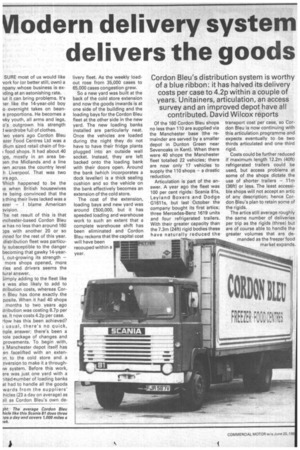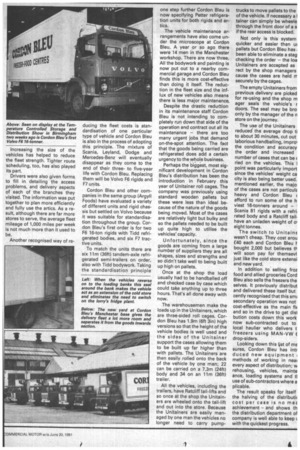Vlodern delivery system delivers the goods
Page 44

Page 45

If you've noticed an error in this article please click here to report it so we can fix it.
SURE most of us would like vork for (or better still, own) a npany whose business is exKling at an astonishing rate. lut it can bring problems. It's ler like the 14-year-old boy o overnight takes on bean e proportions. He becomes a vky youth, all arms and legs, o's outgrown his strength wardrobe full of clothes.
Wo years ago Cordon Bleu ezer Food Centres Ltd was a dium sized retail chain of frofood shops. It had about 40 )ps, mostly in an area been the Midlands and a line iwn across the country level h Liverpool. That was two us ago.
Vhich happened to be the ie when British housewives re being convinced that the a thing their lives lacked was a ezer — I blame American avision.
The net result of this is that inchester-based Cordon Bleu w has no less than around 160 D ps with another 20 or so Tined for the rest of this year.
distribution fleet was particuly subsceptible to the danger becoming that gawky 14-yearI, out-growing its strength — more shops opened, more ries and drivers seems the turai answer.
simply adding to the fleet like s was also likely to add to aribution costs, whereas Cor n Bleu has done exactly the posite. When it had 40 shops
months to two years ago ;tribution was costing 8.7p per se. It now costs 4.2p per case. How has this been achieved? ; usual, there's no quick, nple answer; there's been a lole package of changes and provements. To begin with, 3 Manchester depot itself has en facelifted with an exten)n to the cold store and a nversion to make it a through= system. Before this work, are was just one yard with a iited cumber of loading banks at had to handle all the goods wards from the suppliers' hides (23 a day on average) as all as Cordon Bleu's own de
livery fleet. As the weekly loadout rose from 35,000 cases to 65,000 cases congestion grew.
So a new yard was built at the back of the cold store extension and now the goods inwards is at one side of the building and the loading bays for the Cordon Bleu fleet at the other side in the new yard. The new loading banks installed are particularly neat. Once the vehicles are loaded during the night they do not have to have their fridge plants plugged into an outside wall socket. Instead, they are left backed onto the loading bank with their doors open. Around the bank (which incorporates a dock leveller) is a thick sealing cushion and so the vehicle on the bank effectively becomes an extension of the cold store.
The cost of the extension, loading bays and new yard was around £500,000, but it has speeded loading and warehouse work to such an extent that a complete warehouse shift has been eliminated and Cordon Bleu reckons that the capital cost will have been recouped within a year. Of the '160 Cordon Bleu shops no less than 110 are supplied via the Manchester base (the remainder are served by a smaller depot in Dunton Green near Sevenoaks in Kent). When there were 40 shops the Manchester fleet totalled 22 vehicles; there are now only 17 vehicles to supply the 110 shops — a drastic reduction.
Articulation is part of the answer. A year ago the fleet was 100 per cent rigids: Scania 81s, Leyland Boxers and Dodge G1611s, but last October the company bought its first artics; three Mercedes-Benz 1619 units and four refrigerated trailers. With their greater capacity than the 7.3m (24ft) rigid bodies these have naturally reduced the transport cost per case, so Cordon Bleu is now continuing with this articulation programme and expects eventually to be two thirds articulated and one third rigid.
Costs could be further reduced if maximum length 12.2m (40ft) refrigerated trailers could be used, but access problems at some of the shops dictate the use of shorter trailers — 11m (36ft) or less. The least accessible shops will not accept an artic of any description; hence Cordon Bleu's plan to retain some of the rigids, The artics still average roughly the same number of deliveries per trip as the rigids (three) but are of course able to handle the greater volumes that are demanded as the freezer food market expands.
Increasing the size of the vehicles has helped to reduce the fleet strength. Tighter route scheduling, too, has also played its part.
Drivers were also given forms to fill in detailing the access problems, and delivery aspects of each of the branches they visited. The information was put together to plan more efficiently and fully use the artics. As a result, although there are far more stores to serve, the average fleet mileage of 1,000 miles per week is not much more than it used to be.
Another recognised way of re ducing the fleet costs is standardisation of one particular type of vehicle and Cordon Bleu is also in the process of adopting this principle. The mixture of Scania, Leyland, Dodge and Mercedes-Benz will eventually disappear as they come to the end of their threeto five-year life with Cordon Bleu. Replacing them will be Volvo F6 rigids and F7 units.
Cordon Bleu and other companies in the same group (Argyll Foods) have evaluated a variety of different units and rigid chassis but settled on Volvo because it was suitable for standardisation throughout the group. Cordon Bleu's first order is for two F6 16-ton rigids with Tidd refrigerated bodies, and six F7 tractive units.
To match the units there are six llm (36ft) tandem-axle refrigerated semi-trailers on order, also with Tidd bodywork. Taking the standardisation principle one step further Cordon Bleu is now specifying Petter refrigeration units for both rigids and artics.
The vehicle maintenance arrangements have also come under the microscope at Cordon Bleu. A year or so ago there were 14 men in the Manchester workshop. There are now three. All the bodywork and painting is now put out to a nearby commercial garage and Cordon Bleu finds this is more cost-effective than doing it itself. The reduction in the fleet size and the influx of new vehicles also means there is less major maintenance.
Despite the drastic reduction in its maintenance staff Cordon Bleu is not intending to completely run down that side of the operation and contract out all its maintenance — there are too many urgent jobs that demand on-the-spot attention. The fact that the goods being carried are refrigerated does add a certain urgency to the whole business.
Perhaps the biggest, most significant development in Cordon Bleu's distribution has been the introduction in February this year of Unitainer roll cages. The company was previously using standard wooden pallets but these were less than ideal because of the nature of the goods being moved. Most of the cases are relatively light but bulky and so the pallets needed to be built up quite high to utilise the vehicles' capacity.
Unfortunately, since the goods are coming from a large number of suppliers they are all shapes, sizes and strengths and so didn't take well to being built up high on pallets.
Once at the shop the load usually had to be handballed off and checked case by case which could take anything up to three hours. That's all done away with now.
The warehousemen make the loads up in the Unitainers, which are three-sided roll cages. Cordon Bleu has 1.9m (6ft 3in) high versions so that the height of the vehicle bodies is well used and the sides of the Unitainer support the cases allowing them to be built up far higher than with pallets. The Unitainers are then easily rolled onto the back of the vehicle by one man; 22 can be carried on a 7.3m (24ft) body and 34 on an 11m (36ft) trailer.
All the vehicles, including the trailers, have Ratcliff tail-lifts and so once at the shop the Unitainers are wheeled onto the tail-lift and out into the store. Because the Unitainers are easily managed by one man the vehicles no longer need to carry pump
trucks to move pallets to the of the vehicle. If necessary a I tamer can simply be wheele through the front door of a s if the rear access is blocked.
Not only is this system quicker and easier than u: pallets but Cordon Bleu has , been able to eliminate a stag checking the order — the loa Unitainers are accepted as rect by the shop managers cause the cases are held rr securely by the cages.
The empty Unitainers from previous delivery are picked for re-using and the shop m ager seals the vehicle's r doors. The seal may be bro only by the manager of the n store on the journey.
The use of the Unitainers reduced the average drop ti to about 30 minutes, cut out laborious handballing, impro■ the condition and accuracy the order and increased number of cases that can be ried on the vehicles. This I point was particularly import since the vehicles' weight ca city is also being better used. mentioned earlier, the majo of the cases are not particulE heavy and Cordon Bleu afford to run some of the h viest 16-tonners around — Scania 81 rigids with a refri, rated body and a Ratcliff tailhave an unladen weight of o, eight tonnes.
The switch to UnitainE wasn't cheap. They cost arou £40 each and Cordon Bleu t bought 2,000 but believes th will soon pay for themsevl just like the cold store extensi and new yard.
In addition to selling froz food and allied groceries Cord Bleu also sells the freezers the selves. It previously distribut and delivered these itself but cently recognised that this smt secondary operation was not cost-effective as the main fit and so in the drive to get dist bution costs down this work now sub-contracted out to local haulier who delivers t freezers using MAN-VW E drop-siders.
Looking down this Ijst of ME sures, Cordon Bleu has intr duced new equipment methods of working in new every aspect of distribution; w rehousing, vehicles, mainte ance, loading systems and tl use of sub-contractors where a plicable.
The result speaks for itself the halving of the distributir cost per case is no me achievement — and shows th the distribution department of company is well able to keep t with the quickest progress.








































































































